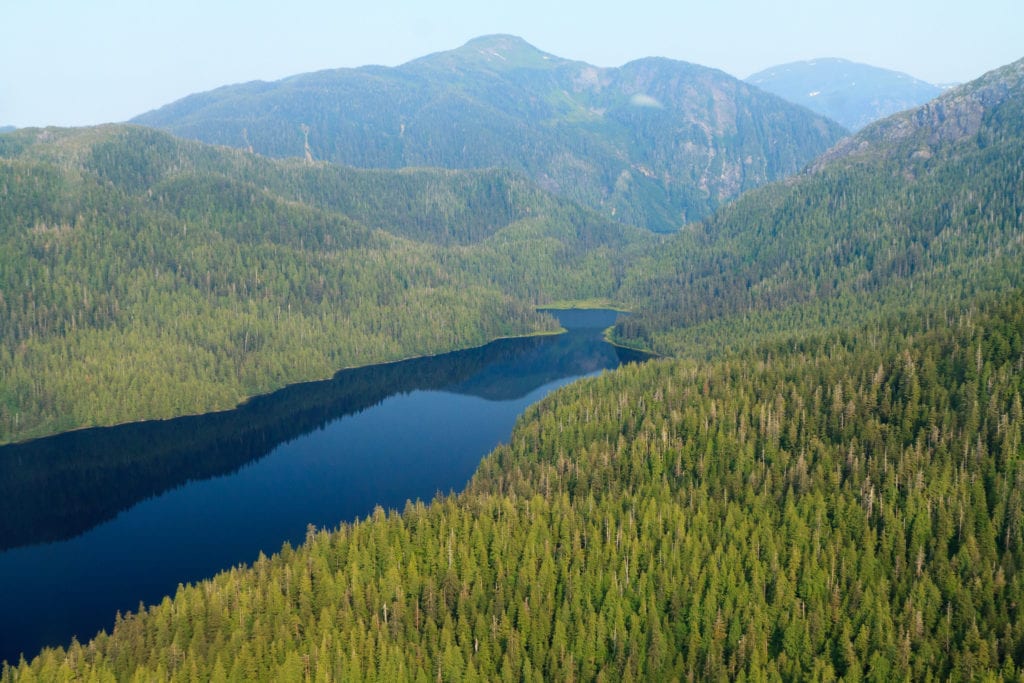
A U.S. Department of Agriculture decision to repeal or replace a decision exempting Tongass National Forest from the roadless rule is seen as a plus for tourism, environment and fisheries and a detriment to mining, logging and other economic development.
The Biden administration announcement drew kudos from Trout Unlimited and the Southeast Alaska Conservation Council and criticism from Alaska’s Gov. Mike Dunleavy and the state’s congressional delegation.
A 2020 decision by the Trump administration lifted roadless restrictions on over 9 million acres of the 17-million-acre Tongass.
When the USDA announced its new intent on Friday, June 11, Chris Wood president and CEO of Trout Unlimited, called it a good step to get things back on track. “Our national forests are extraordinarily valuable to local communities, fish and wildlife and our economy,” he said. “They help regulate our climate and clean our air and water. It’s time to look forward and manage our forests with these value in mind.”
“The Tongass produces more salmon than all other national forests combined,” said Austin Williams, Alaska legal and policy director for TU. “Today’s announcement is the first step toward ensuring that continues, and that the fishing and tourism industries, which account for more than one in four local jobs, will continue to drive southeast Alaska’s economy.”
Gov. Mike Dunleavy expressed “disappointment in the Biden administration’s latest suppression of Alaska’s economic opportunity,” part of his ongoing campaign to get the state’s economy moving again as the number of new COVID-19 cases ebb in Alaska. “North to the future means north to opportunity, and we will use every tool available to push back on the latest imposition,” Dunleavy said.
Robert Venables, executive director of the Southeast Conference, said that federal politics “are playing pingpong with the live and resources of Alaskans.”
“Uncertainty and empty promises from every administration diminishes the opportunity to effectively access resources, such as rare-earth and other minerals, and raises the cost to develop the ‘green energy’ hydroelectric assets located in the Tongass, which saw expensive impacts on development and maintenance due to regulations, restrictions and construction mandates of the roadless rule,” he said.
“The one-size-fits-all roadless rule has restricted access needed for tourism, recreation, timber, mining, transportation and the development of renewable energy,” said Sen. Lisa Murkowski, R-Alaska, calling for an end to the “yo-yo effect” occurring every time the nation gets a new president.
“It’s time we move forward, utilizing the Tongass land management plan and all the other applicable environmental laws to guide new projects and activities and provide long overdue regulatory certainty to the region,” she said. Sen. Dan Sullivan, and Rep. Don Young, both R-Alaska, also support the exemption to the roadless rule in the Tongass. Sullivan called the decision “an unacceptable whipsaw in federal policy,” and Young said rolling back the roadless rule exemption showed “a terrible disregard for Alaskans’ right to govern themselves.”
Efforts to reach Tessa Axelson, director of the Alaska Forest Association, for comment on behalf of that industry, were unsuccessful.
Meredith Trainor, executive director of the Southeast Alaska Conservation Council, expressed
cautious optimism, saying she looks forward to the Biden administration taking the final step to put the national rule back in place on the Tongass. The announcement was issued as part of a periodic update to the federal regulatory agenda and was short on details except to note that the process for doing so would be consistent with timelines laid out by President Biden’s Day 1 executive order calling for a review of rules promulgated during the Trump administration with an eye to whether federal decision-making processes were followed, and best available science was applied, she said.
“96% of those who submitted comments during the National Environmental Policy Act process were in support of keeping the national roadless rule in place on the Tongass National Forest, and all of us in that 96% cheer the news that the Trump rule will be either repealed or replaced, and heartily encourage the administration to put this thing to bed by repealing the Trump rule once and for all,” she said.





